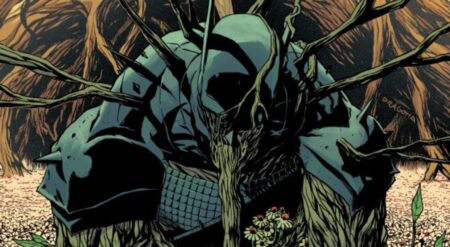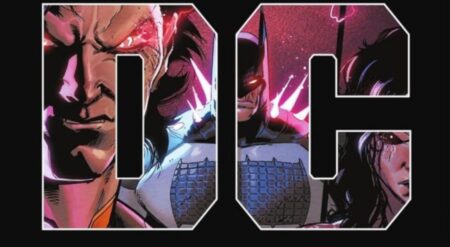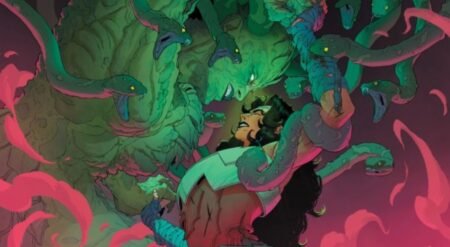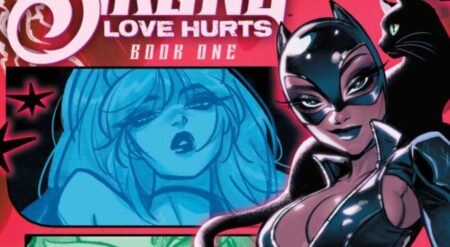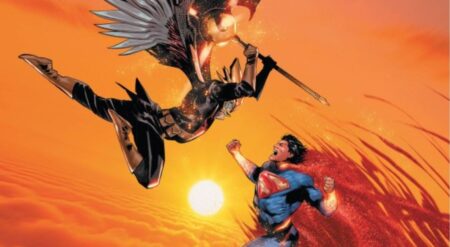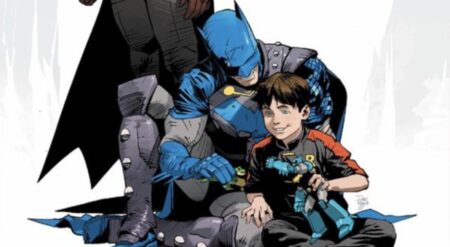
DC Mech #1 is the start of a new series published by DC Comics, written by Kenny Porter, art by Baldemar Rivas, colours by Mike Spicer, and letters by Tom Napolitano. In an alternate universe where superpowers and aliens are outlawed, the superheroes on Earth resort to giant mechs. There is one major goal, to be prepared for when Darkseid reaches the planet.
The biggest surprise inside the plot of this new world is the tone that is set very early on. Beginning in 1945 with the Justice Society of America, there is a brutal and shocking opening battle that certainly demonstrates just how violent this story can get. DC Mech #1 is unafraid to kill important heroes. After that opening is a reimagining of Superman’s origin, perhaps the most famous origin of all time. The deviation there is fascinating. The dark tone of this world makes it stand out from other stories of this genre, and the massive changes in the history add unpredictability to what could happen. A time bomb is set early in the comic or an ominous threat on its way, and perhaps that threat makes its presence known too early in this series. The fights are epic, with the only gripe being that the latter one is interrupted by another scene that damages the momentum. But there is only a slight dip as the movement and action in this comic are almost constant.
The characters are very interesting inside this first issue. With so much exposition, which is understandable due to the brand new universe being introduced, it is a while before a character with personality is brought into the book. There are many recognisable figures included just within a starting chapter, and not all of them will make it into the next one. Having spent so much time with these characters, seeing a tragic fate in an alternate universe still instills a deep sadness within me. The main characters of the tale are added to the story and immediately their unique attributes are hinted at. They aren’t given long-winded backstories, just comments and asides that hint at changed backstories and frustrations at problems brewing early in the series
The art is fantastic as the emphasis is obviously pressed on the mechs the characters sit in. Each robot has an individual design that really fits the identity of who controls it. All of them look sleek as Rivas has opted to not fill each robot with detail. It allows for a cleaner look which helps accentuate the important parts of each mech. Some of the mechs are presented in a way that suggests larger versions of who they represent, whilst others have attachments or amendments. But then many of the heroes and villains have brand new costume designs when they are outside, showing two separate pieces of content. The battles are brilliant adaptations of powers and abilities and are superbly energetic.
The colours are creative and exceptional. For much of the issue, the shades are incredibly bright but not overpowering. The blending of the tones is subtle but beautifully rich. But for one family in particular there is a huge difference in how they have been depicted in any other comic. The lead colour for this group is white—powerful and stark in its execution. The textures of that white on the metal are excellent and help to suggest dimensions and shapes. The lettering has a faux-handwritten font that is easy to read and fits the art style.
DC Mech #1 is unflinching. What I initially believed to be a fun robotic romp turned brutal and dark instantly. This is shocking but a strong method of establishing the comic, forcing you to take it seriously. The energetic and intense mech madness is still there as the action in this comic is nonstop, but Porter does not shy away from violence, nor does Rivas pull any punches drawing it.
DC Mech #1 is available where comics are sold.
DC Mech #1
TL;DR
DC Mech #1 is unflinching. What I initially believed to be a fun robotic romp turned brutal and dark instantly. This is shocking but a strong method of establishing the comic, forcing you to take it seriously. The energetic and intense mech madness is still there as the action in this comic is nonstop, but Porter does not shy away from violence, nor does Rivas pull any punches drawing it.

